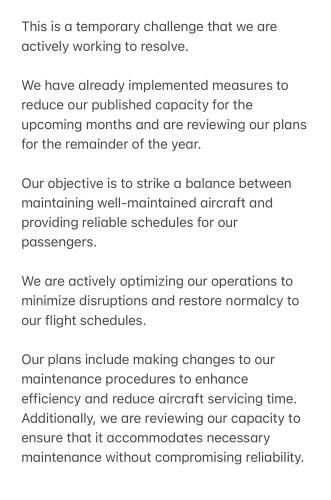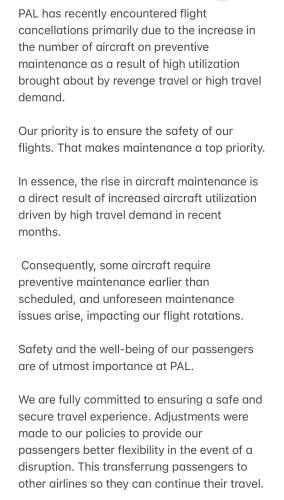Rights of Airline Passengers in the Philippines
12




12
Rights of Airline Passengers in the Philippines
|
Administrator
|
It is also known as Air Passenger Bill of Rights (APBR).
This is the summary. 
Making Sense
|
|
Administrator
|
Amidst the Christmas Chaos, Cebu Pacific was fined only P5,000.00. Well, that's what the Law says
Unsolicited advice, if you know any of the victims, tell them to sue. You have better chance of winning compensation claims, and make 5J pay up.
Making Sense
|
|
That is a very funny penalty indeed. I'm definitely looking forward to Hollande's visit. It's still a ways away, so hopefully the recent tragedy in France won't lead it to being rescheduled or anything. |
|
Administrator
|
In reply to this post by Arianespace
Cebu Pacific questions the amount of fine it had to pay the government.
His questions was actually the debate at CAB before handing down CAB Resolution No. 4 series of 2015, imposing them P52,110,000 fine for the inconvenience of 10,400 passengers. The debate was is it per flight, or per passenger? Fine would have been considerably less if it were the former. The majority vote was that it was the latter. Personally though, I think it was on "per flight basis" which was the intent of the law. And for that 5J has all reasons to ask the basis. Decision however was that it all boils down to one thing, license to fly. We call it Legislative Franchise. And the congressional license happens to be added to the CAB law because 5J license to fly is also a law. And the law perfectly states "public convenience". That sounds a broad definition, but who are they really? Duh.... riding public, meaning passengers! You can do the math why it is 52 million.The decision also carries a reprimand, meaning the next time it happens again will already entitle CAB to SUSPEND Cebu Pacific. Had the inconvenience been the result of government action, i.e. closures due to typhoons, it would have been okay. The thing is other airlines flew and they didn't at the most important dates of the year for Filipinos.
Making Sense
|
|
Administrator
|
That is the antiquated CAB Law which is more like the mother law. Its more like a trunk of a tree for example. The stem leading you to the leaves will give you the answers.
Perhaps you may want also to read this:
You might be wondering what regulations are we talking about here? Well, one of those is in the very first post of this forum thread. 
Making Sense
|
Re: 5J Fined for Christmas Bruhaha
I still find the APBR to be toothless and worthless... I have a pending complaint vs PAL with CAB filed last April 2014 that still remains unresolved. CAB wouldn't even respond to follow-up emails requesting for a status update or at least a timeline when the complaint can be resolved. They only acted when I involved the CSC... sheesh....  |
|
Administrator
|
I did answer the question here above.
Now its the time of the CAB ED to answer his version of it
Making Sense
|
|
In reply to this post by Arianespace
There is a central question regarding the application of the APBR section on "DISCLOSURE". The question is "Does it apply ONLY to the Contract of Carriage (CoC) or does it imply disclosures must also be made "elsewhere" particularly in the case of ON-LINE bookings"?
Other than the requirement that the CoC be explained to the passenger at the time of purchase, the remainder could be addressed by a set of criteria to be met in order for the CoC to be APPROVED by the regulatory agency. This would also mean the the airlines' on-line ticketing function would need to include ONLY a link to the CoC. The "disclosure" section of the APBR would seem to be of benefit to air passengers ONLY if it requires the key and essential information to be included on the Itenerary with the passenger allowed to accept or cancel what is stated there. If you consider that there are at least 4 separate documents (Itenerary, CoC, Warsaw Convention and Montreal Convention) a person would need to read 60+ verbose pages before every booking (in case of changes) as a matter of "ordinary diligence" in the course of purchasing an airline ticket. I have posed this question to the CAB/DTOC, but if you should know of anyplace where this has been "officially" clarified in some way (court case, agency decision, etc.) Please let me know. |
Re: Some issues with the Air Passenger Bill of Rights (APBR)
|
Administrator
|
Before you are confused further, APBR applies only to domestic carrier operating in the Philippines. Online and interline in the Philippines, yes. International No. It does not bind international airlines. That would be covered by Warsaw as amended by Montreal Convention. COC as to operating airline only. You must prove which one is the cause of the cause. Of course you have to read the terms and conditions of fare, first and foremost, and then the carriage. That is SOP.
Making Sense
|
|
Part of your response does not seem to be consistent with SECTION 3 of the APBR....just FYI
|
Re: Some issues with the Air Passenger Bill of Rights (APBR)
|
Administrator
|
My answer would still be the same (no application to international carriers) when we are talking about "online" and "interline" disclosures, section 3 notwithstanding. You can however argue that in court. Good luck to that.
http://www.cab.gov.ph/downloads/air-passenger-bill-of-rights
Making Sense
|
|
In reply to this post by Arianespace
Senate hearing next week, Wednesday, June 21 on the incessant complaints against Cebu Pacific flight cancellations and lack of compensation and customer service. Not sure what or if anything will come out of this... but they should include PAL and Z2 as well...
Namumuro na! Senate to probe Cebu Pacific flight cancellations, offloading
|
|
Administrator
|
There is this ATO regulation issued sometime in 1982, IIRC, which require 4-6 airline seats, depending on size, BAC or Hawker Siddeley, to be vacant for VIPs, usually reserved for gov't officials. They remained unfilled until 2 hours prior to departure. To fill them up in the last minute, airline overbooks 4-6 seats, which we often heard as "chance passengers". Their transport is dependent upon the VIPs not showing up.
In one CAB case against CEB that I know, it argued they were not bound by said regulation because they are a private carrier, unlike PAL which was a government owned airline. The case was settled with CEB providing travel voucher, which is more than the plane fare paid. So no penalty was imposed on the airline. However, PAL continued that practice in 1992 after privatization, this time you pay the fare difference for business class seats. Sometime in 2002 i think, PAL introduce the practice of overbooking seats, which you find them now. Noticed the offer given by PAL is way better than the fare you paid, provided you defer your travel to another date? Fact is, they already earned more by accepting a high paying passenger to fly on that date, at your expense, should you surrender your seat. A different scenario however happens when you book flights on low cost carrier. So AO1 was born to answer abuses, known as Joint DOTC-DTI Administrative Order No. 1 Series of 2012, otherwise known as the “Air Passenger Bill of Rights”, which took effect on 21 December 2012, which you can see here. Liability would not arise however, if delay or cancellation is caused by acts of god, (ie typhoon, thunderstorm, flood, volcanic eruption, etc) or airport closure due to fortuitous events, like power interruptions. At best, airlines will just reschedule you to the next available flights, special or regular, which sometimes is months away, basically defeating the purpose of your travel. For PAL, PR5xxx is special flight, categorize either as chartered, replacement, delivery, or rescue.
Making Sense
|
I find AO 1 a bit toothless... I can empathize with passengers whose flights are cancelled, and their new schedule is sometimes a week a way (which is happening now with PAL flights) and the carrier won't be shouldering cost for the extended stay... very difficult especially if you're stuck overseas... Once filed a complaint against PR before the CAB for violating APBR... but all they got was a slap in the wrist.. And this is only an AO... legislation would be much better with stiffer penalties... if not, something similar to EU Regulation 261 would be nice... |
|
Administrator
|
We already have a laws for that (CA146) since 1936, amended by RA11659, effective April 1, 2023, where AAP is the first beneficiary. Another one is the "Law on Transportation", incorporated in the Civil Code enacted in 1950, and some other commercial laws.
But then, you need a lawyer to file that claim in court. Not in CAB. Most of the time, Airlines settles and give you more than what you want because they always lose. Certainly, that is not slap on the wrist. In fact, it is one reason why Air France left the country. Once any of their plane lands, they would not be flying back because they will be taken by the court.
Making Sense
|
Very interesting. I simply thought they left due to poor yields. I wonder they did? |
|
Administrator
|
Bump off a "Filipino" business class passenger in favor of a "French" national, who turns out to be a CEO on the way to a very important business meeting in Europe.
Making Sense
|
|
In reply to this post by romantic_guy08
First time PAL publicly acknowledges all these cancellations...
From Cielo Villaluna.  
|
|
The disruption must be that severe to warrant this communication. If I understood it correctly, they’re cutting back on scheduled flights to match their working fleet?
|
«
Return to Philippine Aviation Forum
|
1 view|%1 views
| Free forum by Nabble | Edit this page |

